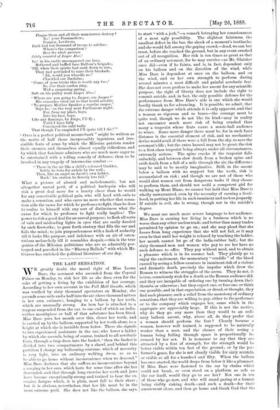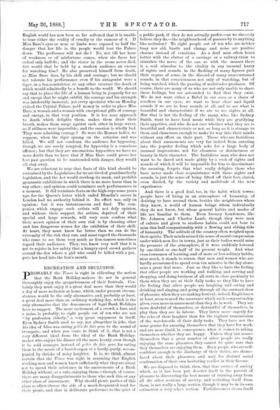THE LAST SENSATION.
WE greatly doubt the moral right of Miss Leona Dare, the aeronaut who ascended from the Crystal Palace on Monday, to risk her life as she does, even for the sake of getting a living by the exhibition of her courage. According to her own account in the Pall Mall Gazette, which was verified by sixty thousand spectators on Monday, she -ascends some mile and a half into the air (three thousand metres is her own estimate), hanging to a balloon by her teeth, which are unusually strong. An iron bar is attached to a trapeze suspended from the car, to one end of which an india- rubber mouthpiece or ball of that substance has been fitted. Miss Dare puts her mouth over this, closes her teeth, and is carried up by the balloon, supported by her teeth alone, to a height at which she is invisible from below. There she signals to two experienced assistants in the car, who lower a ladder by which she ascends, being, of course, trained to all acrobatic feats, through a trap-door, into the basket, "then the basket is divided into two compartments by a shawl, and behind this partition I change my ballooning costume, which of necessity is very light, into an ordinary walking dress, no as to be able to go home without inconvenience when we descend." Miss Dare declares that she suffers no inconvenience beyond u surging in her ears, which lasts for some time after she has descended, and that through long exercise her teeth and jaws have become exceptionally strong and trained to bear the ex- cessive fatigue which, it is plain, must fall to their share ; but it is obvious, nevertheless, that her life must be in the most extreme peril. She does not like the balloon, she says,
to start " with a jerk,"—a remark betraying her consciousness of a most ugly possibility. The slightest faintness, the smallest defect in the bar, the shock of a moment's toothache, and she would fall among the gaping crowd,—dead, we can but trust, before she reached the ground, but in any event crushed out of all recognition. Her risk is ten times as great as that of an ordinary aeronaut, for he may survive—as Mr. Glaisher once did—even if he faints, and is, in fact, dependent only on his balloon and on the direction of the wind, while Miss Dare is dependent at once on the balloon, and on the wind, and on her own strength to perform during several minutes a most difficult and painful acrobatic feat. She does not even profess to make her ascent for any scientific purpose, the right of liberty does not include the right to commit suicide, and, in fact, the only possible defence for the performance from Miss Dare's side is one which she would hardly thank us for advancing. It is possible, we admit, that the extreme danger which attends it is only apparent, and that a woman so vigorous and so brave—the courage must be quite real, though we do not like its kind—may in reality not encounter much more risk of being crushed than many a trapezist whose feats cause a music-hall audience to wince. Some more danger there must be, for in such feats distance is the essential element of risk, and no mechanical device would avail, if there were a fall from the sky, to save the aeronaut's life ; but the extra hazard may not be great, the risk to a first-class trapezist being always, under all circumstances, extremely serious. The spine cracks if the trapezist falls unluckily, and between slow death from a broken spine and swift death from a fall of a mile through the air, the difference may be said to be mostly imaginative. Still, in the ascent below a balloon with no support but the teeth, risk is accumulated on risk ; and though we are not of those who would shut women out from dangerous tasks if they choose to perform them, and should not scold a competent girl for walking up Mont Blanc, we cannot but hold that Miss Dare is wholly unwarranted, even by the necessity of earning a liveli- hood, in putting her life in such imminent and useless jeopardy. If suicide is evil, she is wrong, though not in the suicide's degree.
We must use much more severe language to her audience. Miss Dare is earning her living in a business which is no worse than any other useless trade, and better than many trades permitted by opinion to go on ; and she may plead that she knows from long experience that she will not fail, or it may even be that until her weight is relaxed by touching the ladder, her mouth cannot let go of the india-rubber ball ; but the sixty thousand men and women who pay to see her have no such defence to offer. They pay without need, and to obtain a pleasure which is in its essence bad. They plainly go to enjoy the excitement, the momentary " cruddle " of the blood caused by seeing a fellow-creature in imminent risk of a violent and dramatic death, precisely the impulse which drew the Roman to witness the struggles of the arena. They do not, it is true, consciously wish for a death as the Roman audience did, and they are incapable of ordering one by turning down their thumbs or otherwise; but they expect one, or fear one, or think one possible, and in that expectation, or dread, or thought, they find such pleasure, such a relief from the monotony of ordinary sensations, that they are willing to pay, either to the performer or to the company which engages her, sums which in the aggregate are appreciably large. If this is not the motive, why do they go, any more than they would to an ordi- nary balloon ascent, why, above all, do they prefer that a woman should perform the feat P Clearly because a woman, however well trained, is supposed to be naturally weaker than a man, and the chance of their seeing a human being falling through space is proportionally in- creased by her sex. It is nonsense to say that they are attracted by a feat of strength, for the strength would be better visible within ten feet of the ground ; or by the per- former's grace, for she is not clearly visible for sixty seconds, or visible at all for a hundred and fifty. When the balloon has once started, the world drops from below it like a plummet. If Miss Dare were fastened to the car by chains which could not break, or even stood on a platform as safe as the car itself, would they go to see her? Not one in ten of those who go now, and who will stand gazing at a human being visibly risking death—and such a death—for their amusement alone, and then go home and thank God that the
English world has now been so far softened that it is unable to bear either the reality of cruelty or the rumour of it. If Miss Dare's eyes or nose or limbs were exposed to half the 'danger that her life is, the people would tear the Palace down. The performer will not die ? No, not till her hour of weakness or of misfortune comes, when she faces her ordeal only half-fit ; and the victor in the arena never died, but would that be held by a modern audience an excuse for watching him ? He also preserved himself from death, as Miss Dare does, by his skill and courage ; but we should not tolerate his performance even if his antagonist were a tiger, or a boa-constrictor, or any other creature the death of which would admittedly be a benefit to the world. We should say that to place the life of a human being in jeopardy for no end except that he might exhibit his courage and his strength was intolerably immoral ; yet every spectator who on Monday visited the Crystal Palace, paid money in order to place Miss Dare, a woman, and a woman with exceptional gifts of courage and energy, in that very position. It is her near approach to death which delights them, makes them draw their breath, makes them surge against each other in large waves, as if stillness were impossible ; and the emotion is wholly bad. They were admiring courage ? So were the Roman ladies, we suppose, when the tiger sprang on the retiarius and was killed. We will not condemn the audience for hypocrisy, though we are sorely tempted, for hypocrisy is a conscious offence ; but that they are unconscious hypocrites we have no more doubt than we have that if Miss Dare could prove her feat past question to be unattended with danger, they would all stay away.
We are reluctant to urge that feats of this kind should be restrained by the Legislature, for we are tired of grandmotherly legislation, and the Act would overleap its mark, and prohibit gymnastic exhibitions in which there is no more harm than in any other; and opinion could terminate such performances in a moment. It did terminate feats on the high-rope some years ago, for the Queen's letter which ended Blondin's career in London had no authority behind it. Its effect was only on opinion ; but it was instantaneous and final. The com- panies which engage such artists will not defy opinion, and without their support the artists, deprived of their special and large rewards, will very soon confess what their secret opinion of their own risk is by choosing other and less dangerous scenes for the exhibition of their skill. At heart, they must know far better than we can do the extremity of the risk they run, and must regard the thousands who come to see them very much as lion-tamers sometimes regard their audiences. They, too, know very well that it is not to rejoice in her safety that a hungry-eyed crowd gathers around the den where a girl who could be killed with a pat, pats her head into the lion's mouth.



































 Previous page
Previous page